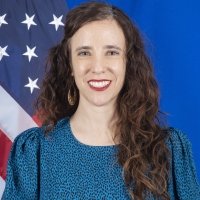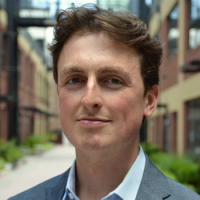U.S. Diplomacy for LGBTQIA+ Rights Around the World: A Snapshot and a Look Forward
Advancing human rights around the world has been a diplomatic objective of the United States for a long while. Even with the U.S.’s complicated history, an incredible amount of work is done to push other countries around the globe to adopt more progressive and just policies for all people. One issue central to these endeavors is propelling the advancement of international LGBTQIA+ human rights.
Recently the First Annual Interagency Report on the Implementation of the Presidential Memorandum on Advancing the Human Rights of LGBTQI+ Persons Around the World was released detailing U.S. agencies’ role at the nexus of diplomacy and LGBTQI+ human rights. During our event, we dove into the interagency report, what the work entails, and its impact. We also discussed the innovative strategies currently on the table to take the fight for global LGBTQI+ equality to new heights.
Selected Quotes
Jay Gilliam
“At USAID when we talk about inclusive development, we’re really talking about an equitable development approach that’s built on understanding that every individual, every community, of all diverse identities and experiences, is really instrumental in transforming their own societies. This includes that engagement with LGBTQIA+ people and communities throughout the development process because we know that this leads to better outcomes."
“Starting from that human rights perspective is really important. I think a lot of places that might not go for pro-LGBTQIA+ rights, we can probably get them on the same page to say let’s ensure there’s no violence, there’s no discrimination, there’s no stigmatization against LGBTQIA+ persons. And then I think the next part of that discussion, with particularly non-permissive environments and officials in those spaces, is to help them think through how leaving out LGBTQIA+ persons in whatever sector we might be talking about is actually detrimental to their development goals."
Jessica Stern
“When Deputy Secretary of State Wendy Sherman launched the [Interagency] report, she said ‘this is not a victory lap’ and I really admire her framing. The way I see the report is, it was an opportunity for all of the foreign policy and foreign assistance agencies to inventory what they have accomplished to date, but by no means to sit back and rest on our haunches. It’s really a chance to identify places where momentum has been easy and has been launched, but also to identify potential opportunities for renewed effort. And we actually have a section in the report for every agency about challenges in implementing the memorandum, and it’s actually that section that’s perhaps the most revealing.”
“The challenges are acute, and whenever I come into a place of public education and dialogue like this, I want to convey two things—urgency and hope. And that is my most sincere and fact-based way of framing the moment. So urgency because the more you know about how LGBTQIA+ people are treated around the world, the more heartbroken you become. The more you see systemic and individual acts of discrimination and violence. …but the other part is hope. And I think the thing that gets me out of bed every day is the feeling of hope… Progress is happening… I think the biggest challenge we face is that there needs to be more of us, and the biggest opportunity we have is that when we engage, we make change happen.”
“LGBTQIA+ rights are central to US foreign policy, and LGBTQIA+ rights are a national security priority. And it makes a lot of sense when you think about it, because the countries that are unstable, the countries where violence is rife, the countries that are anti-democratic, those are the places where extremism is born. Places where people are marginalized and excluded are places where people become angry and disenfranchised. So one of the things that we always recommend is that to have a strong and prosperous society, take everyone’s well-being into account. That’s how you make countries safer and how you make the world safer.”
Speakers


Moderator
